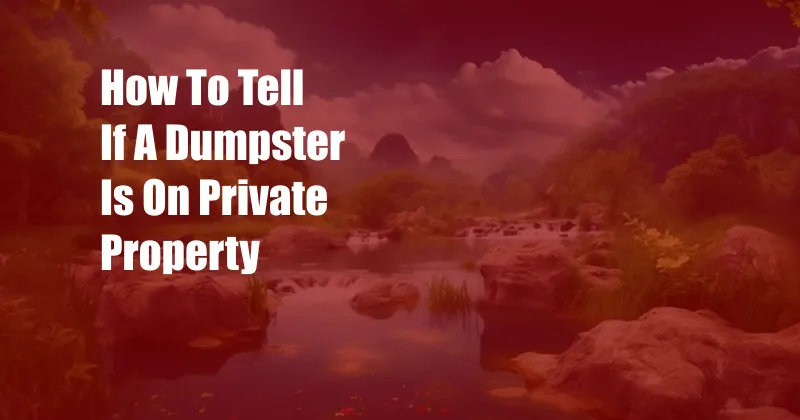
How to Determine if a Dumpster is on Private Property
I recently encountered a perplexing situation where I needed to dispose of some bulky items and stumbled upon a dumpster. But before I could heave my trash into it, a nagging doubt lingered in my mind: Was this dumpster rightfully occupying public space or trespassing on private property?
To my surprise, differentiating between public and private dumpsters isn’t as straightforward as it seems. A few subtle clues can unravel this mystery, guiding you towards the appropriate disposal route.
Identifying Private Property
Private property encompasses any land or structure owned by an individual, group, or organization. Dumpsters placed on such premises are typically reserved for the exclusive use of the property’s occupants or tenants.
Several telltale signs can help you identify private property:
- Fencing or Barriers: Look for physical barriers, such as fences, gates, or hedges, enclosing the area where the dumpster is located.
- Posted Signs: Notice any signs or placards explicitly stating that the property is private or that only authorized personnel are allowed entry.
- Private Driveways: If the dumpster is situated in a driveway or behind a private gate, it’s likely assigned to the corresponding residence or business.
Public vs. Private Dumpsters
Public dumpsters, on the other hand, are designated for general public use and are usually located in publicly accessible areas such as streets, parking lots, or designated waste disposal sites.
These dumpsters often bear markings or logos indicating their public nature, such as:
- Municipal Seals: Dumpsters provided by local municipalities often display the city or county seal.
- Waste Management Companies: Private companies operating waste management services may have their branding or contact information prominently displayed on the dumpster.
- Open Accessibility: Public dumpsters are generally open 24/7 and accessible without any restrictions or barriers.
Tips for Identifying Private Dumpsters
- Observe the Surroundings: Take a moment to familiarize yourself with the area where the dumpster is placed. If you notice any signs of private ownership, such as fencing, gates, or restricted access, proceed with caution.
- Look for Indicators: Inspect the dumpster itself for any labels, markings, or stickers that might provide clues about its ownership. If there’s no clear indication, it’s safer to assume the dumpster is private.
- Check Local Regulations: Some municipalities have specific ordinances governing the placement of dumpsters on private property. Check with your local authorities to determine any applicable regulations.
Expert Advice
1. Respect Private Property: Always err on the side of caution and avoid depositing trash in dumpsters on private property without proper authorization. Disposing of waste in unauthorized areas can result in fines, legal penalties, or environmental damage.
2. Contact the Property Owner: If you’re unsure about the ownership of a dumpster, don’t hesitate to contact the property owner or manager. They can provide clear guidance on whether the dumpster is open for public use.
FAQ
Q: Can I be held responsible for dumping in a private dumpster?
A: Yes, trespassing and illegal dumping can result in legal consequences, including fines, impounding, or even criminal charges.
Q: What should I do if I witness illegal dumping?
A: Report any instances of illegal dumping to your local authorities or the appropriate environmental agency. They can take necessary action to address the issue.
Conclusion
Determining whether a dumpster is on private property requires careful observation and an understanding of local regulations. By following the tips and advice outlined in this article, you can avoid trespassing and ensure proper waste disposal. Remember, respecting private property and adhering to waste management guidelines are crucial for maintaining a clean and orderly environment.
Are you interested in learning more about waste disposal best practices and sustainable waste management initiatives?